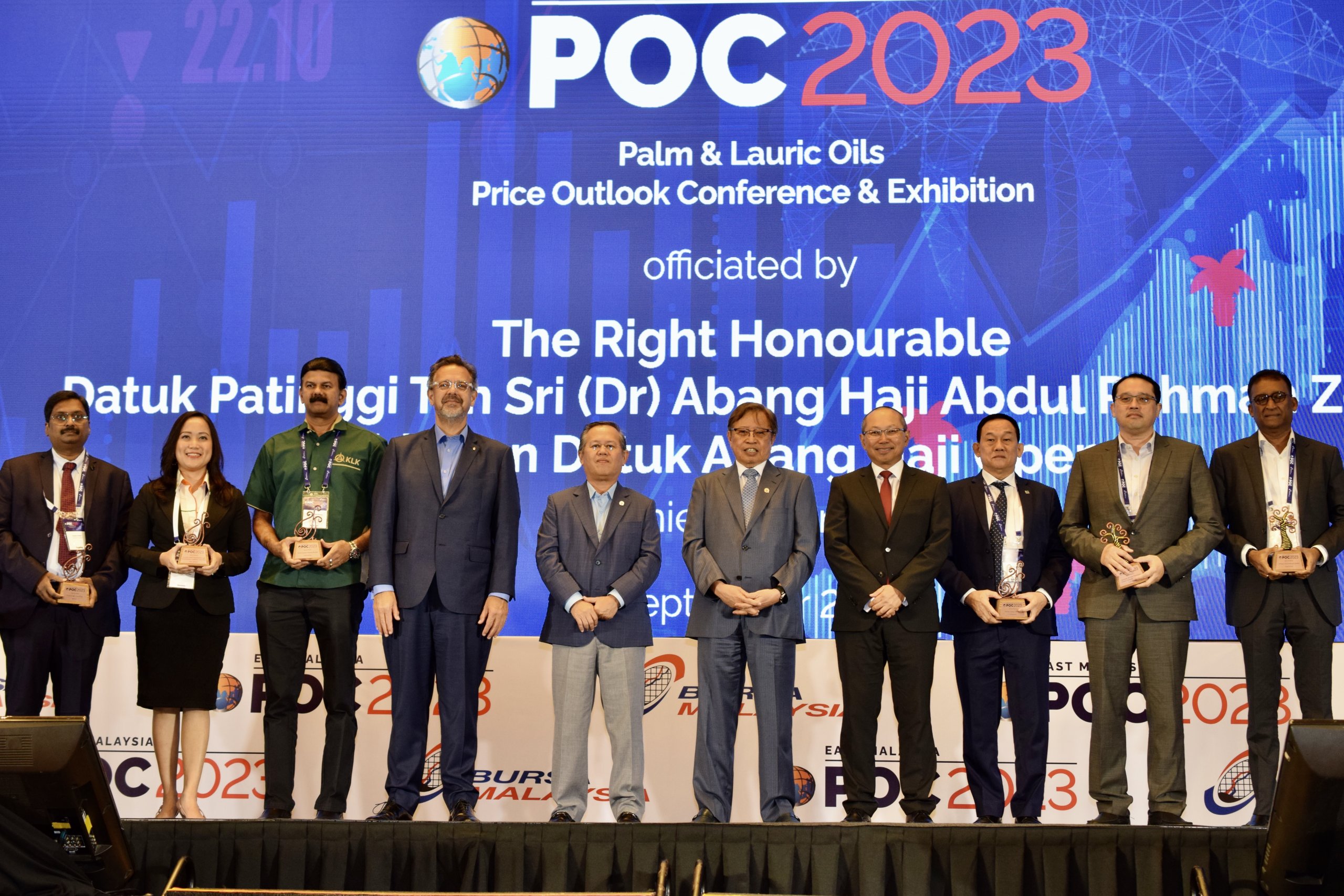
Abang Johari, flanked by Abdul Wahid (fourth right) and Martin, joins Muhammad Umar (fourth left) and other officials in a group photo, taken after the presentation of tokens to the sponsors and supporters. — Photo by Roystein Emmor
KUCHING (Sept 5): The prospects of crude palm oil (CPO) production for Sarawak remain robust, as indicated by 1.7 million metric tonnes recorded in the first half of this year, says Premier Datuk Patinggi Tan Sri Abang Johari Tun Openg.
This figure, he said, represented an increase of two per cent over the production registered in the same period last year.
“Sarawak’s production of CPO in 2022 reached four million metric tonnes, reflecting a notable increase of 2.5 per cent from the previous year’s figure,” he said in his special address for the ‘Second East Malaysia Palm and Lauric Oils Price Outlook Conference and Exhibition (EMPOC) 2023 here today.
Abang Johari pointed out that while Sarawak’s palm oil industry had made impressive strides and contributed significantly to the region’s economic development, it had also faced several challenges that demanded attention and action.
“Market volatility and price fluctuations pose significant challenges to palm oil producers and traders. External factors such as changes in global demands, trade policies, and weather conditions can also impact palm oil prices.
“These uncertainties make it challenging for businesses to plan for the long term, and may affect investments in research and sustainable practices,” he said.
Given the current uncertain global conditions, Abang Johari said it was crucial for companies to prioritise sound risk management strategies towards mitigating losses and effectively managing expectations.
“I urge businesses to consider hedging their exposures to today’s volatile markets by utilising futures and options contracts available on Bursa Malaysia Derivatives.
“This approach will help safeguard against potential financial risks and ensure a more stable path forward,” he said.
Abang Johari also acknowledged the criticisms hurled against palm oil due to its association with deforestation, destruction of wildlife habitats, and greenhouse gas emissions.
“Building and maintaining consumer’s trust through transparent and traceable supply chains are vital for the industry’s future growth and market access.
“Collaborative initiatives involving government agencies, industry associations, non-governmental organisations (NGOs), and local communities are fundamental in overcoming these challenges. By working together, stakeholders can address environmental and social issues, improve best practices, and promote responsible palm oil production.”
On that note, the Premier spoke about his recent trip to Sweden where the topic of oil palm came up during his meeting with the country’s deputy prime minister and officials.
“One of the areas of where the EU (European Union) is concerned about is child labour. But they do not realise that in Sarawak, we have our Native Customary Rights (NCR) smallholders of oil palm growers.
“These smallholders are actually family enterprises where their teenage children would often help their parents out in the estates, particularly during the school holidays,” he said.
He said he relayed to them that this could not be categorised as child labour, ‘in that this is a culture that we have in the family-owned farms, including that of oil palms.
“They nodded their heads, but whether they acknowledged what I told them or not, at least they listened and learnt that it’s part of our culture.
“This is what I can do for oil palm growers in order to make them aware of what we are doing,” he said.
Later during a press conference, Abang Johari said Sarawak had maximised the land areas meant for the oil palm industry, and had also allowed smallholders, particularly the NCR landholders, to participate in small-scale oil palm plantation programmes.
Adding on, he also highlighted the need for oil palm industry players to adjust to the needs of preserving of the environment and at the same time, look into managing their plantations using technology.
“The plantation sector has been requesting for us to allow more foreign labour in the industry.
“This has been an inherent issue, but perhaps at this junction, they could look into mechanisation, particularly in terms of harvesting through the use of sensors and AI (artificial intelligence).”
Abang Johari also encouraged the oil palm industry to carry out research on this so that they would not have to rely solely on foreign labour.
“As our economy migrates upwards, technology has to follow suit – this will make the industry sustainable.”
Also present were Bursa Malaysia Berhad chairman Tan Sri Abdul Wahid Omar, Malaysia Derivatives Berhad chairman and Bursa Malaysia chief executive officer Datuk Muhammad Umar Swift, and Deputy Minister II for Food Industry, Commodity and Regional Development Martin Ben.

